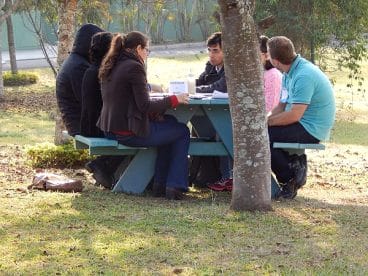
Aug 19, 2016 | Focolare Worldwide
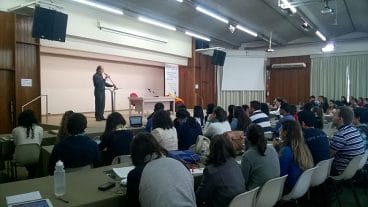 “I was totally demotivated in my profession as an engineer…Now I have rediscovered its importance in another light…” “I am in my second year in architecture. The university presents it in a very commercial light, where the human aspect is missing. This course has exceeded my expectations.” These were just two of the many impressions expressed by the 80 Latin-American university students at the end of the intense week of the course (25-30July), at the Mariapolis Ginetta Congress Centre close to Sao Paulo, Brazil. This cultural initiative promoted by the Sophia Latin-American Academic Centre (ALC) of the Focolare Movement, was an innovative project, well expressed by its title: “The theoretical-practical fundaments of the paradigm of fraternity, projected in the social, political, economic and cultural sciences.”
“I was totally demotivated in my profession as an engineer…Now I have rediscovered its importance in another light…” “I am in my second year in architecture. The university presents it in a very commercial light, where the human aspect is missing. This course has exceeded my expectations.” These were just two of the many impressions expressed by the 80 Latin-American university students at the end of the intense week of the course (25-30July), at the Mariapolis Ginetta Congress Centre close to Sao Paulo, Brazil. This cultural initiative promoted by the Sophia Latin-American Academic Centre (ALC) of the Focolare Movement, was an innovative project, well expressed by its title: “The theoretical-practical fundaments of the paradigm of fraternity, projected in the social, political, economic and cultural sciences.” 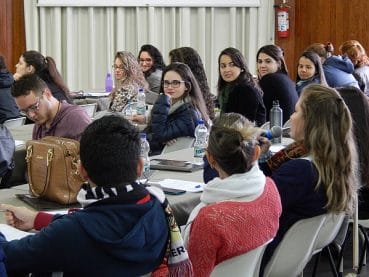 The Latin-American youths penetrated deeply into the wounds that still afflict their peoples: the socio-economic crisis, drama of the indigenous populations, and great issues of the Amazon, the social inequality and violence, of which,” as the Argentine political expert, Juan Esteban Belderrain, commented, “Latin America holds the said world title. In 2012 the number of homicides rose to over 140,000, one third of the world index and over 50,000 in Brazil alone. This sad phenomenon is on the rise. Against this dramatic background the course members delved into the cultural novelty introduced into their own disciplines, to imbue thoughts and lifestyles with the concrete activation of the paradigm of fraternity. For example, as explained by the Brazilian professor, Marconi Aurélio, and Political Sciences professor, Silva, with the application of this paradigm already practised for 20 years, politics overcomes the conflicting dimension, majorities and oppositions are viewed as complementary, part of the truth can also be gathered from opponents, and the participation of citizens is activated.
The Latin-American youths penetrated deeply into the wounds that still afflict their peoples: the socio-economic crisis, drama of the indigenous populations, and great issues of the Amazon, the social inequality and violence, of which,” as the Argentine political expert, Juan Esteban Belderrain, commented, “Latin America holds the said world title. In 2012 the number of homicides rose to over 140,000, one third of the world index and over 50,000 in Brazil alone. This sad phenomenon is on the rise. Against this dramatic background the course members delved into the cultural novelty introduced into their own disciplines, to imbue thoughts and lifestyles with the concrete activation of the paradigm of fraternity. For example, as explained by the Brazilian professor, Marconi Aurélio, and Political Sciences professor, Silva, with the application of this paradigm already practised for 20 years, politics overcomes the conflicting dimension, majorities and oppositions are viewed as complementary, part of the truth can also be gathered from opponents, and the participation of citizens is activated.  This new cultural paradigm was also put into practice in the interpersonal relationships between students and professors of various Latin-American cultures, in an interdisciplinary and multicultural dimension. But there is even more. Starting from the youth who undertook to identify the greater urgencies of their cities and with the support of the professors, projects covering the political, economic and social aspects were laid out and implemented. In conclusion, Prof. Sergio Rondinara of the Sophia University Institute (Italy) of which Sophia ALC is the first extra-European section, expressed great hope in his welcoming speech, and said that this reality gives “a beautiful, crystal-clear view of the future of this continent which has extraordinary potentials.”
This new cultural paradigm was also put into practice in the interpersonal relationships between students and professors of various Latin-American cultures, in an interdisciplinary and multicultural dimension. But there is even more. Starting from the youth who undertook to identify the greater urgencies of their cities and with the support of the professors, projects covering the political, economic and social aspects were laid out and implemented. In conclusion, Prof. Sergio Rondinara of the Sophia University Institute (Italy) of which Sophia ALC is the first extra-European section, expressed great hope in his welcoming speech, and said that this reality gives “a beautiful, crystal-clear view of the future of this continent which has extraordinary potentials.”

Aug 18, 2016 | Focolare Worldwide
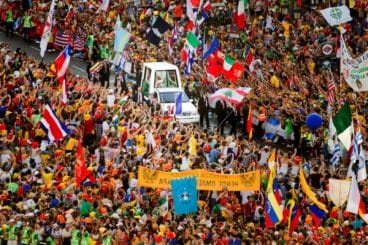 There was much enthusiasm, a desire to know more and to be protagonists of their future at Jasna, Slovakia on August 1-6. “We could never have dreamed that it would be like this. If we refuse to content ourselves with just being comfortable, if we are not couch potatoe Christians, then we will really be able to be protagonists of history,” said young Annita from Argentina when it was time to leave. “The courageous proposals that were offered by Pope Francis at WYD called for an immediate response, but also an understanding that would develop over time and that’s what we tried to do here at Jasna,” explained philosopher Gianluca Falconi. Along with theologian Michel Vandeleene and psychologist Antonella Deponte they offered a multi-disciplinary approach to the Pope’s proposals and how they could be implemented. Francesco from Krakow talked about fighting the fear of spreading peace in a world so filled with hatred. He talked about the value of mercy and of the Cross, of the obstacles that have to be overcome in order to encounter Jesus. But how could these challenges be translated concretely into daily life? The days together in Slovakia offered an opportunity to go into details, to examine the reasons behind things, to ask questions about one’s own life. The internationality of the group provided the possibility of a comparison with other parts of the world: from Lebanon to Australia, from France to the United States, from Russia to Ukraine. The organizers explain that “One of the strongest topics had nothing to do with the existence of God or the big questions of life, but the relationship with the other, the relationship with diversity. These were the themes around which the discussion developed. What came out were issues of a more personal kind, the innate value of each one of us, the chances and the difficulties that relationships with an other can represent, with an enemy, with someone who thinks differently.”
There was much enthusiasm, a desire to know more and to be protagonists of their future at Jasna, Slovakia on August 1-6. “We could never have dreamed that it would be like this. If we refuse to content ourselves with just being comfortable, if we are not couch potatoe Christians, then we will really be able to be protagonists of history,” said young Annita from Argentina when it was time to leave. “The courageous proposals that were offered by Pope Francis at WYD called for an immediate response, but also an understanding that would develop over time and that’s what we tried to do here at Jasna,” explained philosopher Gianluca Falconi. Along with theologian Michel Vandeleene and psychologist Antonella Deponte they offered a multi-disciplinary approach to the Pope’s proposals and how they could be implemented. Francesco from Krakow talked about fighting the fear of spreading peace in a world so filled with hatred. He talked about the value of mercy and of the Cross, of the obstacles that have to be overcome in order to encounter Jesus. But how could these challenges be translated concretely into daily life? The days together in Slovakia offered an opportunity to go into details, to examine the reasons behind things, to ask questions about one’s own life. The internationality of the group provided the possibility of a comparison with other parts of the world: from Lebanon to Australia, from France to the United States, from Russia to Ukraine. The organizers explain that “One of the strongest topics had nothing to do with the existence of God or the big questions of life, but the relationship with the other, the relationship with diversity. These were the themes around which the discussion developed. What came out were issues of a more personal kind, the innate value of each one of us, the chances and the difficulties that relationships with an other can represent, with an enemy, with someone who thinks differently.”  All the questions were based on personal experiences, like that of a young man from Iraq who highlighted the difficulties he is facing in relating to people from his own country. For some, a move in the direction of “the other” proved impossible. Therefore, smaller discussion groups were formed and also opportunities for personal conversations that were more spiritual, psychological or sociological. There were also discussions about the relationship with oneself, autonomy, personal dignity, feelings and open-mindedness. Another topic was the future: choosing a direction for one’s own life. This topic was discussed in a mixed group made up of teenagers, university students and workers, Christians from different Churches, agnostics, non-believers. They spoke in 13 languages and came from a variety of backgrounds, quite a diverse crowd, but alike in their thirst for truth. “It’s not the usual way young people present themselves in today’s society,” commented Gianluca who has had long experience in the field of education. Carla, an Italian remarked: “I’m 15 years old and there were people over thirty in my group. It’s beautiful because I had something to compare myself with, to ask for further explaining and feel assured.” It was an interweaving of generations, languages and cultures: “Philosophy isn’t very appreciated in my own country, because the approach to reality is different,” explained Antoine from Lebanon. “But I’m glad to be able to know other ways of thinking that are different from mine.” The young people take home with them an experience of fraternity that is the antidote to evil. Anna from Milan admits: “The Pope told us to never stop dreaming, and what we’re living now is a dream come true.”
All the questions were based on personal experiences, like that of a young man from Iraq who highlighted the difficulties he is facing in relating to people from his own country. For some, a move in the direction of “the other” proved impossible. Therefore, smaller discussion groups were formed and also opportunities for personal conversations that were more spiritual, psychological or sociological. There were also discussions about the relationship with oneself, autonomy, personal dignity, feelings and open-mindedness. Another topic was the future: choosing a direction for one’s own life. This topic was discussed in a mixed group made up of teenagers, university students and workers, Christians from different Churches, agnostics, non-believers. They spoke in 13 languages and came from a variety of backgrounds, quite a diverse crowd, but alike in their thirst for truth. “It’s not the usual way young people present themselves in today’s society,” commented Gianluca who has had long experience in the field of education. Carla, an Italian remarked: “I’m 15 years old and there were people over thirty in my group. It’s beautiful because I had something to compare myself with, to ask for further explaining and feel assured.” It was an interweaving of generations, languages and cultures: “Philosophy isn’t very appreciated in my own country, because the approach to reality is different,” explained Antoine from Lebanon. “But I’m glad to be able to know other ways of thinking that are different from mine.” The young people take home with them an experience of fraternity that is the antidote to evil. Anna from Milan admits: “The Pope told us to never stop dreaming, and what we’re living now is a dream come true.”

Aug 17, 2016 | Focolare Worldwide
 «Shocked by the news of the sudden death of our dear Frère Roger Schutz, we join the entire Community of Taize in this moment of prayer and deep pain. He had committed his whole life to God and his brethren, and has been crowned with the palm of martyrdom. Frère Roger was a constructor of peace, and a prophet of hope and joy. “God wants us to be happy,“ he had written to me about two months ago, and now we think of him in the fullness of joy in the heart of the Trinity. We are particularly close to you in this situation. We hope that the deep 40-year friendship with Frère Roger and the Community of Taizé, will continue even now that he has gone to Heaven.» Chiara Lubich So also today, we wish to remember him as a builder of peace, and a prophet of hope and joy.
«Shocked by the news of the sudden death of our dear Frère Roger Schutz, we join the entire Community of Taize in this moment of prayer and deep pain. He had committed his whole life to God and his brethren, and has been crowned with the palm of martyrdom. Frère Roger was a constructor of peace, and a prophet of hope and joy. “God wants us to be happy,“ he had written to me about two months ago, and now we think of him in the fullness of joy in the heart of the Trinity. We are particularly close to you in this situation. We hope that the deep 40-year friendship with Frère Roger and the Community of Taizé, will continue even now that he has gone to Heaven.» Chiara Lubich So also today, we wish to remember him as a builder of peace, and a prophet of hope and joy.
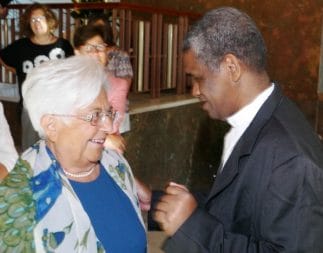
Aug 16, 2016 | Focolare Worldwide
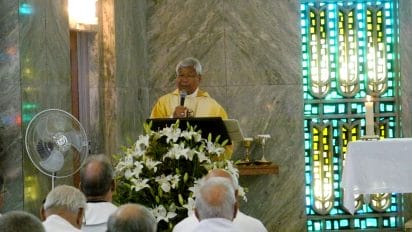 Every summer bishops from around the world gather for a preriod of rest and sharing of their lives while reflecting on being a Church that is instrument and sign of unity in the great variety of settings of the global society that is marked by so many tensions and contradictions. This year they met in Braga, Portugal. “In the Church today it is the moment of unity and communion, the moment when we are being invited to have a collective experience of God. We’re not here only because we’re each bishops, but because we’re brothers. We’d like to be a body of brothers like the first Apostles with Jesus.” These words were spoken by Cardinal João Bráz de Aviz during their Mass inside the Chapel of Apparitions as the 67 bishops from 27 countries made a pilgrimage to Fatima on August 4th.
Every summer bishops from around the world gather for a preriod of rest and sharing of their lives while reflecting on being a Church that is instrument and sign of unity in the great variety of settings of the global society that is marked by so many tensions and contradictions. This year they met in Braga, Portugal. “In the Church today it is the moment of unity and communion, the moment when we are being invited to have a collective experience of God. We’re not here only because we’re each bishops, but because we’re brothers. We’d like to be a body of brothers like the first Apostles with Jesus.” These words were spoken by Cardinal João Bráz de Aviz during their Mass inside the Chapel of Apparitions as the 67 bishops from 27 countries made a pilgrimage to Fatima on August 4th. 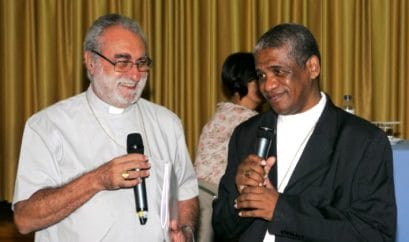 At the conclusion of the gathering Cardinal Francis Xavier Kriengsak Kovithavanij, Archbishop of Bangkok, Thailand summarized their experience in the following way: “We were really happy during these days. We’ve lived like brothers. We felt free and able to open our hearts to one another. Our only Teacher was truly among us. We felt that we were living in the house of Mary.” The bishops were welcomed at Mater Ecclesia Apostolic Centre near the Shrine of Our Lady of Sameiro, by Dom Jorge Ortiga, Archbishop of Braga. It was an appropriate setting for reflecting on the current world scene with international political expert Pasquale Ferrara, and the reform of the Church in the wake of Pope Francis with theologian Piero Coda. It was against this background that the bishops questioned themselves on how to be bishops with a synodal approach and put into practice a culture of shepherding that is marked by communion.
At the conclusion of the gathering Cardinal Francis Xavier Kriengsak Kovithavanij, Archbishop of Bangkok, Thailand summarized their experience in the following way: “We were really happy during these days. We’ve lived like brothers. We felt free and able to open our hearts to one another. Our only Teacher was truly among us. We felt that we were living in the house of Mary.” The bishops were welcomed at Mater Ecclesia Apostolic Centre near the Shrine of Our Lady of Sameiro, by Dom Jorge Ortiga, Archbishop of Braga. It was an appropriate setting for reflecting on the current world scene with international political expert Pasquale Ferrara, and the reform of the Church in the wake of Pope Francis with theologian Piero Coda. It was against this background that the bishops questioned themselves on how to be bishops with a synodal approach and put into practice a culture of shepherding that is marked by communion. 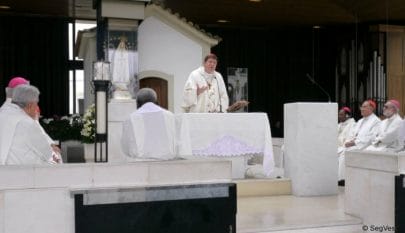 Plenary and small group meetings, walks and meals together were all opportunities to put in common painful situations and signs of hope: the anguished cry that rises from the Church in the Middle East; the growth of fruitful integration between basic ecclesial communities and new Movements and Communities in a large diocese of Brazil that offers a significant example of the Letter Iuvenescit Ecclesia (The Church that Rejuvinates), which was published in June by the Congregation for the Doctrine of the Faith; the challenges and potential of inculturation in a pluralistic context like India; the fruits that can come forth when a bishop and his auxiliaries live the common life and when a bishop manages to make himself a brother and friend of his priests; the arduous task of evangelization in a place like Madagascar that is marked by poverty.
Plenary and small group meetings, walks and meals together were all opportunities to put in common painful situations and signs of hope: the anguished cry that rises from the Church in the Middle East; the growth of fruitful integration between basic ecclesial communities and new Movements and Communities in a large diocese of Brazil that offers a significant example of the Letter Iuvenescit Ecclesia (The Church that Rejuvinates), which was published in June by the Congregation for the Doctrine of the Faith; the challenges and potential of inculturation in a pluralistic context like India; the fruits that can come forth when a bishop and his auxiliaries live the common life and when a bishop manages to make himself a brother and friend of his priests; the arduous task of evangelization in a place like Madagascar that is marked by poverty.  The two-day visit by bishops from other Churches – two Lutherans and one Syro-Orthodox – and an afternnon meeting with seven bishops from Portugal was mutually enriching. The spiritual part of the meeting had two main themes: Christ Crucified, which is one of the carindal points of the spirituality of unity; and love for the Church. These were presented in talks by Focolare president, Maria Voce (Jesus Forsaken, God’s Window & Humanity’s Window); and by co-president Jesús Morán (The Ecclesial Genius of Chiara Lubich and the Charism of Unity).
The two-day visit by bishops from other Churches – two Lutherans and one Syro-Orthodox – and an afternnon meeting with seven bishops from Portugal was mutually enriching. The spiritual part of the meeting had two main themes: Christ Crucified, which is one of the carindal points of the spirituality of unity; and love for the Church. These were presented in talks by Focolare president, Maria Voce (Jesus Forsaken, God’s Window & Humanity’s Window); and by co-president Jesús Morán (The Ecclesial Genius of Chiara Lubich and the Charism of Unity).

Aug 12, 2016 | Focolare Worldwide
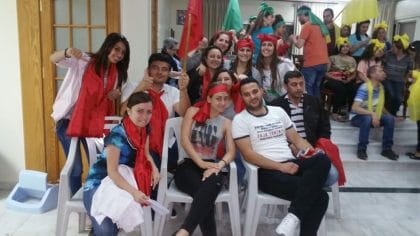 “I learned to transform the negative into positive and transmit it to my friends and not to despair in the face of difficulties.” Said in a context like that of Syria, where the young people live “under continuous psychological pressure” each word weighs differently. “Sad to say, there is continuous news from Syria about civilian war victims, especially in Aleppo,” Pope Francis reminded all once again in the Angelus of 7 August. He continued saying “It is unacceptable that many innocent people – and many children – have to pay the price of the conflict, which is that of closed hearts and the lack of will of those in power.” He then urged all to take everything to heart and personally support the Syrian brothers and sisters with their prayers and solidarity. War is stressful even if there are seeds of hope, and it is what we must continue to focus on. “We felt that we had to do something different with the youth, to support them from the spiritual and human standpoint,” recounted Lina Morcosand Murad Al Shawareb, educators of the Focolare Movement, «and this is why we thought of inviting Sr Noha Daccache, Lebanese, of the Sacred Heart, and university professor specialising in social sciences. We chose to deepen, in this year of mercy, the concept of “Mercy and prayer in our daily lives.”
“I learned to transform the negative into positive and transmit it to my friends and not to despair in the face of difficulties.” Said in a context like that of Syria, where the young people live “under continuous psychological pressure” each word weighs differently. “Sad to say, there is continuous news from Syria about civilian war victims, especially in Aleppo,” Pope Francis reminded all once again in the Angelus of 7 August. He continued saying “It is unacceptable that many innocent people – and many children – have to pay the price of the conflict, which is that of closed hearts and the lack of will of those in power.” He then urged all to take everything to heart and personally support the Syrian brothers and sisters with their prayers and solidarity. War is stressful even if there are seeds of hope, and it is what we must continue to focus on. “We felt that we had to do something different with the youth, to support them from the spiritual and human standpoint,” recounted Lina Morcosand Murad Al Shawareb, educators of the Focolare Movement, «and this is why we thought of inviting Sr Noha Daccache, Lebanese, of the Sacred Heart, and university professor specialising in social sciences. We chose to deepen, in this year of mercy, the concept of “Mercy and prayer in our daily lives.”  “Already during the preparations – through the iPhone application WhatsApp – there was a great sense of maturity,” seen also during the three-day event (from 10 to 12 June). Sr Noha’s reflections on mercy and prayer, and the Sacred Scriptures also seen in relation to their spiritual lives, triggered questions and reflections. “But on the first day we realised that we were all stressed out due to the situation we were undergoing. So we first held a dialogue session, after which someone suggested a moment of prayer. It was a moving moment with songs and meditations, where the youth said spontaneous prayers and with faith, asked for the gift of Peace.” “On the second day, we delved deeper into the various aspects of life that hindered us from fully corresponding to what God asks of us each day. On the last day instead, Chiara Lubich’s article, ‘Better than yesterday’, was really enlightening since it gave us a concrete key to always love Jesus better.” A girl wrote, “I understood that I had to live the present moment solemnly, to offer the pain and live it for Jesus; all the rest is secondary. While praying I felt that Jesus was saying to me: I am with you.” As she was leaving, Sr Caccache said “You people are really outstanding – I shall keep you in my heart and pray intensely for Peace.” Maria Chiara De Lorenzo
“Already during the preparations – through the iPhone application WhatsApp – there was a great sense of maturity,” seen also during the three-day event (from 10 to 12 June). Sr Noha’s reflections on mercy and prayer, and the Sacred Scriptures also seen in relation to their spiritual lives, triggered questions and reflections. “But on the first day we realised that we were all stressed out due to the situation we were undergoing. So we first held a dialogue session, after which someone suggested a moment of prayer. It was a moving moment with songs and meditations, where the youth said spontaneous prayers and with faith, asked for the gift of Peace.” “On the second day, we delved deeper into the various aspects of life that hindered us from fully corresponding to what God asks of us each day. On the last day instead, Chiara Lubich’s article, ‘Better than yesterday’, was really enlightening since it gave us a concrete key to always love Jesus better.” A girl wrote, “I understood that I had to live the present moment solemnly, to offer the pain and live it for Jesus; all the rest is secondary. While praying I felt that Jesus was saying to me: I am with you.” As she was leaving, Sr Caccache said “You people are really outstanding – I shall keep you in my heart and pray intensely for Peace.” Maria Chiara De Lorenzo
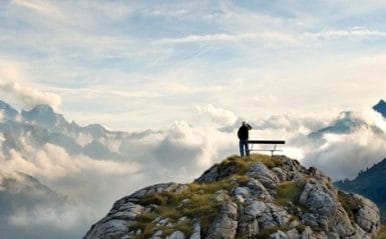
Aug 8, 2016 | Focolare Worldwide, Senza categoria
 “No one in my family knew the Focolare, and I remember that the only reason why I attended the weekly Saturday appointments where we delved into the life of the Gospel was that I felt loved without conditions. I was born and raised in Ascoli Piceno, in the Marche region of Italy. Every year I attended religious education classes for young people, which established me on my faith journey. When I was 19 I had to face knee surgery that resulted in several complications. While I was still in hospital the doctors told me that I’d no longer be able to play volleyball and that I wouldn’t have the full use of my leg. Right then, I understood what it meant to say that ‘God is the ideal that never crumbles’ and I firmly decided for God. If I couldn’t play any kind of sport anymore, God would certainly find something else for me to do. After high school I began university, but went back every Saturday to help out at the parish, setting up games for teens and young people. Even though I couldn’t play, I found out how much fun it can be to help others play, getting them to perform some feats that were truly acrobatic! Throughout those years I became aware of God’s powerful call in my heart, to to spend my whole life for Him in others. At the 2007 Mariapolis, after receiving Jesus in the Holy Eucharist, I felt in my heart what my path in life might be: to bring the charism of unity into my diocese. It was an absolute decision for God in favour of something quite precise. This plunge in God led me to live life to the full, in the fullness of joy, and it allowed me to face a situation that on the human level I would never have been able to face. In 2010, I began to have new problems with my leg that had been through surgery, then the other leg, my back, and, in a matter of few months it was an effort for me to walk and stand on my feet. The doctors couldn’t come up with an explanations and since I was close to finishing my diploma, they hypothesized that it was some sort of nervous condition or form of depression. In my heart I continued to feel a joy that came from living the same ideal together with my friends in the Focolare and couldn’t understand what was going on. One night, I escaped to a church and prayed in front of Eucharistic Jesus: “If it enters into your will for me to begin these medical treatments, give me a sign. If, instead, I have some sort of strange ailment, let me know, because I would like to go on being a gift for the others.” That very treatment revealed a rare genetic illness that was causing all the problems I was experiencing and that continues to cause the chronic pain that I constantly live with. At first my mind was invaded by questions and despair. How would I be able to live for others? I realized that God’s Love didn’t change in front of the pain, perhaps I understood it in a different way, but His love always remained immense, endless. What should I do then? What could I do? I would carry on loving and building unity with everyone around me, even if it required more effort now, even if I felt like I’d rather be left alone. A few months later I was asked to take on a group of small boys. I wondered: will I be able to do it? I put aside my fears and decided to place myself at the service of others. Today, I have to say that over these years, the kids in that group were my strength and courage. Because, by loving, you can overcome anything. So many times I felt like I wouldn’t be physically able to hold up, but I did. I saw for myself that ‘Nothing is impossible for God’.”
“No one in my family knew the Focolare, and I remember that the only reason why I attended the weekly Saturday appointments where we delved into the life of the Gospel was that I felt loved without conditions. I was born and raised in Ascoli Piceno, in the Marche region of Italy. Every year I attended religious education classes for young people, which established me on my faith journey. When I was 19 I had to face knee surgery that resulted in several complications. While I was still in hospital the doctors told me that I’d no longer be able to play volleyball and that I wouldn’t have the full use of my leg. Right then, I understood what it meant to say that ‘God is the ideal that never crumbles’ and I firmly decided for God. If I couldn’t play any kind of sport anymore, God would certainly find something else for me to do. After high school I began university, but went back every Saturday to help out at the parish, setting up games for teens and young people. Even though I couldn’t play, I found out how much fun it can be to help others play, getting them to perform some feats that were truly acrobatic! Throughout those years I became aware of God’s powerful call in my heart, to to spend my whole life for Him in others. At the 2007 Mariapolis, after receiving Jesus in the Holy Eucharist, I felt in my heart what my path in life might be: to bring the charism of unity into my diocese. It was an absolute decision for God in favour of something quite precise. This plunge in God led me to live life to the full, in the fullness of joy, and it allowed me to face a situation that on the human level I would never have been able to face. In 2010, I began to have new problems with my leg that had been through surgery, then the other leg, my back, and, in a matter of few months it was an effort for me to walk and stand on my feet. The doctors couldn’t come up with an explanations and since I was close to finishing my diploma, they hypothesized that it was some sort of nervous condition or form of depression. In my heart I continued to feel a joy that came from living the same ideal together with my friends in the Focolare and couldn’t understand what was going on. One night, I escaped to a church and prayed in front of Eucharistic Jesus: “If it enters into your will for me to begin these medical treatments, give me a sign. If, instead, I have some sort of strange ailment, let me know, because I would like to go on being a gift for the others.” That very treatment revealed a rare genetic illness that was causing all the problems I was experiencing and that continues to cause the chronic pain that I constantly live with. At first my mind was invaded by questions and despair. How would I be able to live for others? I realized that God’s Love didn’t change in front of the pain, perhaps I understood it in a different way, but His love always remained immense, endless. What should I do then? What could I do? I would carry on loving and building unity with everyone around me, even if it required more effort now, even if I felt like I’d rather be left alone. A few months later I was asked to take on a group of small boys. I wondered: will I be able to do it? I put aside my fears and decided to place myself at the service of others. Today, I have to say that over these years, the kids in that group were my strength and courage. Because, by loving, you can overcome anything. So many times I felt like I wouldn’t be physically able to hold up, but I did. I saw for myself that ‘Nothing is impossible for God’.”

 “I was totally demotivated in my profession as an engineer…Now I have rediscovered its importance in another light…” “I am in my second year in architecture. The university presents it in a very commercial light, where the human aspect is missing. This course has exceeded my expectations.” These were just two of the many impressions expressed by the 80 Latin-American university students at the end of the intense week of the course (25-30July), at the Mariapolis Ginetta Congress Centre close to Sao Paulo, Brazil. This cultural initiative promoted by the Sophia Latin-American Academic Centre (ALC) of the Focolare Movement, was an innovative project, well expressed by its title: “The theoretical-practical fundaments of the paradigm of fraternity, projected in the social, political, economic and cultural sciences.”
“I was totally demotivated in my profession as an engineer…Now I have rediscovered its importance in another light…” “I am in my second year in architecture. The university presents it in a very commercial light, where the human aspect is missing. This course has exceeded my expectations.” These were just two of the many impressions expressed by the 80 Latin-American university students at the end of the intense week of the course (25-30July), at the Mariapolis Ginetta Congress Centre close to Sao Paulo, Brazil. This cultural initiative promoted by the Sophia Latin-American Academic Centre (ALC) of the Focolare Movement, was an innovative project, well expressed by its title: “The theoretical-practical fundaments of the paradigm of fraternity, projected in the social, political, economic and cultural sciences.”  The Latin-American youths penetrated deeply into the wounds that still afflict their peoples: the socio-economic crisis, drama of the indigenous populations, and great issues of the Amazon, the social inequality and violence, of which,” as the Argentine political expert, Juan Esteban Belderrain, commented, “Latin America holds the said world title. In 2012 the number of homicides rose to over 140,000, one third of the world index and over 50,000 in Brazil alone. This sad phenomenon is on the rise. Against this dramatic background the course members delved into the cultural novelty introduced into their own disciplines, to imbue thoughts and lifestyles with the concrete activation of the paradigm of fraternity. For example, as explained by the Brazilian professor, Marconi Aurélio, and Political Sciences professor, Silva, with the application of this paradigm already practised for 20 years, politics overcomes the conflicting dimension, majorities and oppositions are viewed as complementary, part of the truth can also be gathered from opponents, and the participation of citizens is activated.
The Latin-American youths penetrated deeply into the wounds that still afflict their peoples: the socio-economic crisis, drama of the indigenous populations, and great issues of the Amazon, the social inequality and violence, of which,” as the Argentine political expert, Juan Esteban Belderrain, commented, “Latin America holds the said world title. In 2012 the number of homicides rose to over 140,000, one third of the world index and over 50,000 in Brazil alone. This sad phenomenon is on the rise. Against this dramatic background the course members delved into the cultural novelty introduced into their own disciplines, to imbue thoughts and lifestyles with the concrete activation of the paradigm of fraternity. For example, as explained by the Brazilian professor, Marconi Aurélio, and Political Sciences professor, Silva, with the application of this paradigm already practised for 20 years, politics overcomes the conflicting dimension, majorities and oppositions are viewed as complementary, part of the truth can also be gathered from opponents, and the participation of citizens is activated.  This new cultural paradigm was also put into practice in the interpersonal relationships between students and professors of various Latin-American cultures, in an interdisciplinary and multicultural dimension. But there is even more. Starting from the youth who undertook to identify the greater urgencies of their cities and with the support of the professors, projects covering the political, economic and social aspects were laid out and implemented. In conclusion, Prof. Sergio Rondinara of the Sophia University Institute (Italy) of which Sophia ALC is the first extra-European section, expressed great hope in his welcoming speech, and said that this reality gives “a beautiful, crystal-clear view of the future of this continent which has extraordinary potentials.”
This new cultural paradigm was also put into practice in the interpersonal relationships between students and professors of various Latin-American cultures, in an interdisciplinary and multicultural dimension. But there is even more. Starting from the youth who undertook to identify the greater urgencies of their cities and with the support of the professors, projects covering the political, economic and social aspects were laid out and implemented. In conclusion, Prof. Sergio Rondinara of the Sophia University Institute (Italy) of which Sophia ALC is the first extra-European section, expressed great hope in his welcoming speech, and said that this reality gives “a beautiful, crystal-clear view of the future of this continent which has extraordinary potentials.” 




 Every summer bishops from around the world gather for a preriod of rest and sharing of their lives while reflecting on being a Church that is instrument and sign of unity in the great variety of settings of the global society that is marked by so many tensions and contradictions. This year they met in Braga, Portugal. “In the Church today it is the moment of unity and communion, the moment when we are being invited to have a collective experience of God. We’re not here only because we’re each bishops, but because we’re brothers. We’d like to be a body of brothers like the first Apostles with Jesus.” These words were spoken by Cardinal João Bráz de Aviz during their Mass inside the Chapel of Apparitions as the 67 bishops from 27 countries made a pilgrimage to Fatima on August 4th.
Every summer bishops from around the world gather for a preriod of rest and sharing of their lives while reflecting on being a Church that is instrument and sign of unity in the great variety of settings of the global society that is marked by so many tensions and contradictions. This year they met in Braga, Portugal. “In the Church today it is the moment of unity and communion, the moment when we are being invited to have a collective experience of God. We’re not here only because we’re each bishops, but because we’re brothers. We’d like to be a body of brothers like the first Apostles with Jesus.” These words were spoken by Cardinal João Bráz de Aviz during their Mass inside the Chapel of Apparitions as the 67 bishops from 27 countries made a pilgrimage to Fatima on August 4th.  At the conclusion of the gathering Cardinal Francis Xavier Kriengsak Kovithavanij, Archbishop of Bangkok,
At the conclusion of the gathering Cardinal Francis Xavier Kriengsak Kovithavanij, Archbishop of Bangkok,  Plenary and small group meetings, walks and meals together were all opportunities to put in common painful situations and signs of hope: the anguished cry that rises from the Church in the Middle East; the growth of fruitful integration between basic ecclesial communities and new Movements and Communities in a large diocese of
Plenary and small group meetings, walks and meals together were all opportunities to put in common painful situations and signs of hope: the anguished cry that rises from the Church in the Middle East; the growth of fruitful integration between basic ecclesial communities and new Movements and Communities in a large diocese of 

